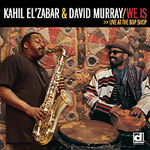|
|
 |
Dusted Reviews
Artist: Kahil El'Zabar & David Murray Album: We Is, Live At The Bop Shop Label: Delmark Review date: Nov. 14, 2004 |

|
|
|
 |
Of the styles of jazz that grew up in the 1970s and ’80s, there is a particular corner of the palette that seems to have snuck in the door disguised as some kind of R&B, but with a clever heart and singular desire to be free of constraint. It’s not the domain of Screamin’ Jay Hawkins or Little Richard, but more the tiny parallel rivulet that has carried artists – like James Blood Ulmer, Jamaaladeen Tacuma, Steve Coleman, and Ronald Shannon Jackson – through to places with some light, some darkness, and so many unexplored places. These musicians employ groove as an element of their overall vocabulary, but frequently dance on top of it, testing the perimeters of their own creativity as if their music were a challenge to the boundaries of freedom as it’s practiced in this society. What happens when I’m dissonant? Will people stop me when I play too loud? People will listen to a renegade, especially if they know he’ll freak out eventually…it’s the groove that brings them in and sets them up, but it’s improvisational flight that knocks them down. It’s not insignificant that the joint résumés of percussionist Kahil El’Zabar and tenor saxophonist David Murray include sessions with all of the above, but also venerable ensemble work, including El’Zabar’s involvement with the AACM and Murray’s stewardship with the World Saxophone Quartet.
On their new Delmark release, We Is: Live At The Bop Shop, recorded in 2002 at the Rochester, N.Y., record shop of the same name, Murray and El’Zabar work through five collaborations (calling them “songs” would set the wrong expectation of what they do), dividing the labor up pretty squarely between El’Zabar’s hand percussion (often sounding like West African drums such as djembes and djundjuns,) trap drums, El-Zabar’s standout growling blues vocalizations, and Murray’s tenor saxophone and occasional bass clarinet outing. (On one song, someone – perhaps El’Zabar – plunks away at what sounds like either a kalimba (African thumb piano) or a damaged Rhodes piano.)
Their exploits on this date never descend into gimmickry, however, or some extended wank in which the artists take the opportunity to solo on every thrift store piece of junk they have in their collective suitcases. As the extended applause between songs would indicate (caution: two minutes of this hour-long recording are dedicated to the Rochester audience’s applause, which translates to 53 cents of the $16 some will spend on this album) El’Zabar and Murray bring their collective muscle to the forefront of each piece with no unnecessary ceremony. There is rarely any semblance of the extended ramp up, the simulated sound of an orchestra tuning prior to performance, that plagues so many improvised sessions: While the five pieces on We Is may have more compositional backbone to them than what is immediately apparent, it is the instant chemistry between Murray and El’Zabar that allows them to sync and groove within a mere measure or two of each piece’s inception. When the two aren’t coming out of the gate like racehorses, Murray’s innate ability to sample past eras and to channel his spiritual mentors makes for a good game. Listeners will hear brief nods, intentional or not, to “Song For My Father,” Wayne Shorter’s “Juju,” a number of Coltrane sessions (particularly on the title track, during which El’Zabar plays a full drum set and the two launch into 10 minutes that could easily have fit on Coltrane’s Interstellar Space) and even fragments of traditional West African song.
El’Zabar engages in a practice similar to Murray’s incantation of past players. However, where Murray relies on the more easily-identifiable melodic reference of songs and players, El’Zabar, at times, seems to focus on grooves that recall not just times but geography as well. “Groove Allure,” the album’s opener, sports a subtle shifting theme by Murray, but is propelled mostly by El’Zabar’s refined world-beat funk, accented by his serpentine, bluesy vocal improvisations. At length, the piece often recalls a collision of gritty, urban rhythm and blues and a looping homage to Mississippi fife-and-drum music, a sound that hadn’t been identified in the current popular cultural lexicon until groups like Mississippi All-Stars and Mr. Airplane Man built their own little empires. In El’Zabar’s hands, however, he quickly shows that this is not another “trick”; it’s the culmination of his artistic exploration and experience that tells him, “that blues in you? This is where it comes out....”
By Andy Freivogel
|







